APEC XI HIGHLIGHTS INNOVATION, OPENING UP AND INCLUSIVE DEVELOPMENT
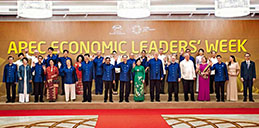
The 'Family Photo' at the APEC Economic Leaders' Meeting in Da Nang, Vietnam, on Nov. 10.
CHINESE PRESIDENT XI JINPING underscored the significance of innovation, opening-up and inclusive development for a new round of global prosperity in Vietnam's central city of Da Nang on Nov. 11.
Speaking at the 25th Asia-Pacific Economic Cooperation (APEC) Economic Leaders' Meeting, Xi called on the 21 APEC members to promote innovation as a strong growth driver, open up their economies to create more space for development, pursue inclusive development to enhance their people's sense of fulfillment and enrich their partnerships and deliver benefits to all involved.
“History has taught us that closed-door development will get us nowhere, while open development is the only right choice,” he said.
“Looking ahead, China will open still wider and its development will deliver even greater benefits to the rest of the world,” he added.
INFRASTRUCTURE Singapore PM: Belt and Road Initiative Positive for Asian Countries
THE CHINA-PROPOSED BELT AND ROAD INITIATIVE is “positive” for Asian countries, said visiting Singaporean Prime Minister Lee Hsien Loong at a discussion of the Council on Foreign Relations, a non-profit U.S. think tank, in Washington D.C. on Oct. 25.
This is “our view in Singapore, which is shared by many in the region,” Lee said. The initiative was a “coherent framework” within which the Asian countries could participate in, he said. “There is a lot of business which needs to be done,” he added.
During the discussion, Lee also mentioned that the Asia-Pacific region has prospered by doing business with China as well as with the rest of the world.
RELATIONS Xi Calls for Cooperation Between APEC, ASEAN
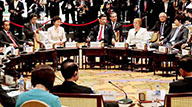
Chinese President Xi Jinping (center) attends an informal dialogue between APEC and ASEAN leaders held in Da Nang, Vietnam, on Nov. 10.
CHINESE PRESIDENT Xi Jinping called for closer cooperation between APEC and ASEAN at an informal dialogue between leaders from the two sides in Da Nang, Vietnam, on Nov. 10.
With APEC being the most influential platform for economic cooperation in the Asia-Pacific region and ASEAN being an organization of regional integration with greatest vitality and potential, the two mechanisms will enjoy a bright future for cooperation, Xi said. Both sides should make joint efforts to build an open economy in Asia and the Pacific as well as a framework of regional cooperation featuring equal consultation, common participation and win-win results with a view to a free-trade area of the Asia-Pacific.
Xi said China stands ready to work with ASEAN in pursuit of an early conclusion of the Regional Comprehensive Economic Partnership (RCEP) negotiations, reiterating China's stance that ASEAN should play a core role in the negotiations.
APEC and ASEAN should work as twin engines, taking more effective measures in areas such as infrastructure, policy and regulations and facilitation of travel to build up a network of interconnectivity in a wider and deeper way, Xi said.
The Chinese leader also called for inclusive and sustainable development, proposing that APEC and ASEAN members align their development strategies with the United Nations’ 2030 Agenda for Sustainable Development.
During the dialogue, Xi said China, as a strategic partner of ASEAN, firmly supports the construction of the ASEAN community and backs ASEAN's core role in regional cooperation.
China will push ahead with development alignment with ASEAN in an in-depth way and forge an upgraded strategic partnership between the two sides so as to build a closer China-ASEAN community of shared future, said the Chinese president.
STRATEGY China to Deepen Pragmatic Cooperation with the Philippines
CHINESE STATE COUNCILOR AND DEFENSE MINISTER General Chang Wanquan said in his talks with Philippine President Rodrigo Duterte on Oct. 25 that China is willing to broaden and deepen pragmatic cooperation with the Philippines.
“China seeks to enhance strategic mutual trust with the Philippines, properly handle differences, and push for a sustained and healthy relationship between our two countries, as we are neighbors,” Chang said in Manila, where he visited President Duterte. Duterte said the Philippines attaches great importance to developing relations with China and he expressed his thanks to China for providing precious support to the development of the Philippines, especially in its efforts to fight terrorism in the southern Philippines.
The Philippines is also willing to deepen its friendship and cooperation with China, and properly handle the South China Sea issue through dialogues, consultations and friendly cooperation. Chang was in the Philippines to attend the 11th ASEAN Defense Ministers' Meeting (ADMM) and the 4th ADMM-Plus Meeting, which includes ASEAN's eight dialogue partners — Australia, China, India, Japan, New Zealand, South Korea, Russia and the United States.
DIPLOMACY 20TH CHINA-ASEAN (10+1) LEADERS’ MEETING HELD
CHINESE PREMIER LI KEQIANG chaired the 20th China-ASEAN (10+1) leaders’ meeting with Philippine President Rodrigo Duterte in the Philippine capital Manila on Nov. 13.
Li said at the meeting that it is a consensus of ASEAN nations that the China-ASEAN relationship is the most vibrant with the richest contents among the relationships ASEAN has with its partners. China has, as always, given priority to its relations with ASEAN in neighborhood diplomacy and is committed to being ASEAN's good friend and good neighbor who can work together to tide over difficult times and strive for a community of shared future with common ideals, prosperity and responsibility.
Li proposed the alignment of the Belt and Road Initiative with the Master Plan on ASEAN Connectivity 2025 to deepen China-ASEAN cooperation in such areas as trade, finance, infrastructure, rules and regulations and personnel. He also proposed the formulation of a vision for strategic partnership between China and ASEAN toward the year 2030.
He urged all ASEAN nations to ratify the upgraded China-ASEAN free trade area (FTA) agreement as soon as possible so as to bring benefits to both sides at an early date.
Advances should be made in Regional Comprehensive Economic Partnership (RCEP) negotiations, implementation of key international industrial capacity cooperation projects and financial cooperation between China and ASEAN, he added.
On people-to-people exchanges, Li said China will provide government scholarships to more than 20,000 ASEAN students over the course of the next three years. China will offer training courses to 3,000 candidates from ASEAN in 2018 and boost cooperation in capacity building in areas such as finance, agriculture, science and technology, culture, public administration and transportation.
Li said that China has also proposed the leaders’ meeting to announce the start of consultations on the text of the Code of Conduct in the South China Sea.
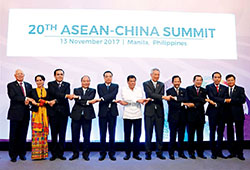
Chinese Premier Li Keqiang (fifth left) with ASEAN leaders at the 20th China-ASEAN Summit in Manila on Nov. 13.
RALLY China-ASEAN International Touring Assembly to be Launched
THE 2017 CHINA-ASEAN International Touring Assembly (CAITA), together with the China-ASEAN Journalists Rally, will be held from December 11 to December 28 in Hepu county, one of the departure ports of the ancient Maritime Silk Road in southern China's Guangxi Zhuang Autonomous Region.
Sponsored by China's General Administration of Sport, the People's Government of Guangxi Zhuang Autonomous Region and the ASEAN Secretariat, the China-ASEAN International Touring Assembly was first held in 2006 and has become an important event of cultural exchange and communication between China and ASEAN countries. Over the last 10 years, the CAITA has visited the Indochinese Peninsula and the Malay Peninsula, covering a total distance of over 10,000 kilometers.
For the first time in history, the route of the event will cover China and all 10 ASEAN countries, making it one of the longest international rally races in the region.
10,000km
The total distance covered by the CAITA over the past 10 years, covering the Indochinese and Malay peninsulas
PUBLISHING Xi's Book on Governance Published in Lao Language
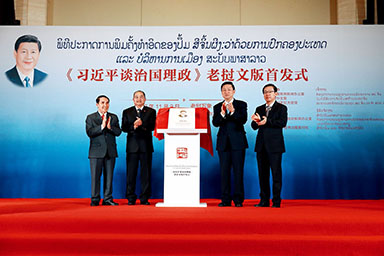
Guo Weimin (second right), vice minister of China's State Council Information Office, and Kikeo Khaikhamphithoune (second left), member of the Secretariat of the Central Committee of the Lao People's Revolutionary Party, with other officials at the book's launching ceremony in Vientiane on Nov. 9.
THE LAO LANGUAGE VERSION of Xi Jinping: The Governance of China was officially launched in the Lao capital Vientiane on Nov. 9.
Speaking at the launching ceremony, Guo Weimin, vice minister of China's State Council Information Office, said the publication of the book's Lao version is of great significance on the occasion of the successful conclusion of the 19th National Congress of the Communist Party of China (CPC) and the upcoming visit by General Secretary of the CPC Central Committee and Chinese President Xi Jinping to Laos.
According to Guo, the book, together with its newly published second volume, features the rich content of Xi Jinping Thought on Socialism with Chinese Characteristics for a New Era and offers an important window for the international community to fully, objectively and rationally understand contemporary China.
For his part, Kikeo Khaikhamphithoune, member of the Secretariat of the Central Committee of the Lao People's Revolutionary Party and Head of the Party's Commission for Publicity and Training, said the publication of the book is a valuable gift for the Lao party and people on the occasion of the upcoming visit of Xi Jinping to Laos.
24
L0009.T002.JPG
The number of languages in which President Xi's book has been published
INVESTMENT Malaysia Stands to Benefit from Belt and Road Initiative
MALAYSIA STANDS to reap benefits from the China-proposed Belt and Road Initiative, a Malaysian government report said, noting the Initiative is integrating economic resources and aligning policies to promote shared development among regions.
According to the Economic Report 2017/18, which was released on Oct. 27 by Malaysian Prime Minister Najib Razak, the Belt and Road Initiative, as a huge plurilateral arrangement, will bring about mutual benefits for all participating countries, including Malaysia.
The Initiative will enhance ASEAN's integration and connectivity strategies and simultaneously strengthen the ASEAN-China Free Trade Agreement (ACFTA) in exploring mutual business opportunities, it said.
However, the report warned that the implementation of the Initiative, which involves various political environments with differing laws and regulations, might potentially result in cross-border differences and institutional challenges.
“In this regard, all participating governments need to play their role in facilitating the situation when divergence and variation arise,” the report said.

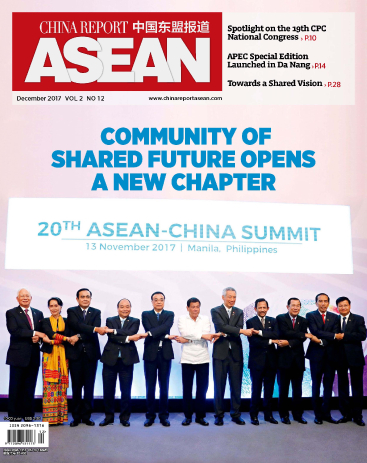
 Copy Reference
Copy Reference